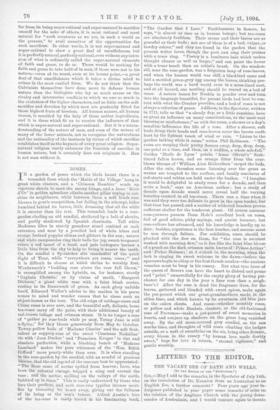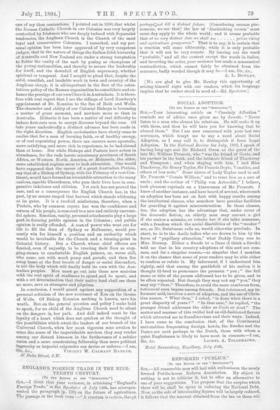LETTERS TO THE EDITOR.
THE VACANT SEE OF BATH AND WELLS.
[To THE EDITOR Or TEE 8PROTAT011,"]
Sin,—May I add to the remarks, in the Spectator of July lath, on the translation of Dr. Reunion from an Australian to an English See, a further comment ? Fear years ago your in dulgence published in your paper some remarks of mine ma the relation of the Anglican Church with the young demo- cracies of Australasia, and I would venture again to iterate, 43ne of my then contentions. I pointed out in 1890, that whilst the Roman Catholic Church in our Colonies was very largely -controlled by Irishmen who are deeply imbued with Separatist tendencies, the Anglican Church is the Church of the most loyal and conservative Colonists. I remarked, and my per- sonal opinion has been later approved of by very competent judges, that in the nature of things the Italian-Irish hierarchy of Australia and New Zealand are under a strong temptation to flatter the vanity of the mob by posing as champions of 'the young nationalities, and thereby to secure the leadership tfor itself, and the downfall of English supremacy, whether spiritual or temporal. And I sought to plead that, despite the .solid, unselfish, and laudable work in town and country of the Anglican clergy, it is all-important in the face of the osten- tatious policy of the Roman organisation to consolidate and en- hance the prestige of our own Church in Australasia'. It is there- fore with real regret that I see the tidings of Lord Rosebery's appointment of Dr. Kennion to the See of Bath and Wells. The character and ability of our Colonial Bishops is becoming a matter of great moment, and nowhere more so than in Australia. Hitherto it has been a matter of real difficulty to induce first-rate men to accept dioceses beyond the seas. Of date years undoubtedly a distinct advance has been made in the right direction. English ecclesiastics have slowly come to realise that for a man of burning faith, or of healthy energy, or of real organising power, there are careers more apostolic, snore satisfying, and more rich in experience, to be had abroad than at home. But while Bishops and Pastors have arisen in abundance, for the rude heroic missionary provinces of South Africa, or Western North America, or Melanesia, the older, more established regions seem to lack attraction. One would have supposed that the career of a great Australian Prelate, • say that of a Bishop of Sydney, with the Primacy of a vast Con- tinent, would have formed an irresistible attraction to the many .zealous, capable Churchmen, who pass their lives here in com- parative indolence and oblivion. Yet such has not proved the .ease, and as a consequence the English Church has, in the past, by no means reaped that harvest which stands whitening at its gates. It is a twofold misfortune, therefore, when a Prelate, who by common repute has won the confidence and esteem of his people, is removed to a new and entirely unevent- ful sphere. Emotion, vanity, personal attachments play a large part in forming public opinion in the Colonies ; and public ,opinion is easily offended, A man of power who went out for life to fill the Sees of Sydney or Melbourne, would pre- sently win for himself a position and an authority which would be invaluable for the Church and a turning-point in 'Colonial history. But a Church whose chief officers are fancied, even if unjustly, to be treating their Sees as step- ping-stones to comfortable English palaces, or, worse still, who come out with much pomp and parade, and then flee away home at the first breath of danger or social discomfort, is not the body which will finally hold its own with the Aus- tralian peoples. Men must go out into these new societies -with the real spirit of readiness to spend and be spent, and with a set determination that their native land shall see them 'no more, save as strangers and pilgrims.
In conclusion, I would guard against any supposition of a personal criticism of the new successor of Ken on the throne -of Wells. Of Bishop Kennion nothing is known, save his worth. But on the general question and policy I make bold to speak, for no child of the Anglican Church need he silent on the dangers in. her path. And dull indeed must be the loyalty of a heart which does not quicken at the thought of 'the possibilities which await the leaders of our branch of the Universal Church, when her most vigorous sons awaken to some due sense of the imperishable services they may render among our distant kinsmen in the furtherance of a subtler union and a more constraining fellowship than mere political ingenuity or imperial exigencies can devise or enforce.—I am,


































 Previous page
Previous page